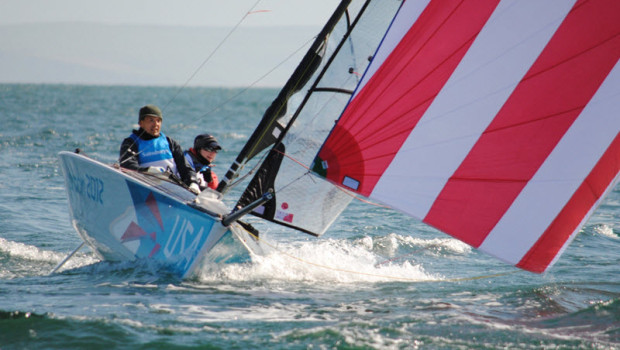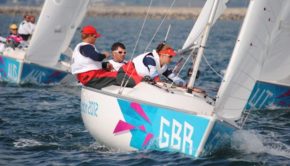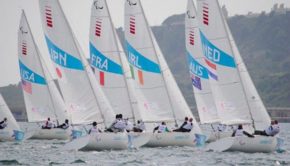Paralympic Games: Setting the record straight
Published on February 17th, 2015
When the International Paralympic Committee (IPC) announced on January 31st that sailing would not be included as a sport for the Tokyo 2020 Paralympic Games, the news came with little warning. The focus has shifted to the International Sailing Federation Disabled Sailing Committee (IFDS), which is responsible for coordinating the Paralympic sailing competition with the IPC. Dr Bernard Destrubé, Vice President of IFDS, provides an update…
 IFDS is still awaiting the official report of IPC’s decision on excluding sailing from Tokyo 2020. In the light of the quantity of outrageously false and damaging information circulating on Facebook, I cannot remain silent any longer. The documents published recently on Facebook and elsewhere, are outdated, and blatantly irrelevant to the final decisions taken by IPC. For this reason IPC had logically and specifically labelled them as confidential!
IFDS is still awaiting the official report of IPC’s decision on excluding sailing from Tokyo 2020. In the light of the quantity of outrageously false and damaging information circulating on Facebook, I cannot remain silent any longer. The documents published recently on Facebook and elsewhere, are outdated, and blatantly irrelevant to the final decisions taken by IPC. For this reason IPC had logically and specifically labelled them as confidential!
IPC had requested all international federations to answer a comprehensive, complex questionnaire, which a small working group within IFDS produced by the July 28, 2014 deadline. Most of the items of this initial document came back flagged orange or red, as can be seen on the pdf document that is circulating. IPC was insufficiently explicit in describing their expectancies, and the general nature of the answers lacked appropriate examples and irrefutable data. Both the completed questionnaire, and IPC’s response were preliminary working documents and it is both misplaced and destructive to criticize IFDS based on these documents!
Immediately following reception this preliminary evaluation, IFDS executive tackled every issue thoroughly. IFDS sent a questionnaire to all MNA’s requesting their assistance in proving their Paralympic sailing activity, collating race results etc. Personal contacts were made with countries not necessarily coming frequently to regattas. Extensive Internet search was carried out to obtain dates, participating countries, and results of international regattas around the world. That work was fruitful, and when IPC returned its subsequent evaluation in September all but four items were flagged green!
The four items related to:
– Rules and Regulations, which remained Amber because of the complexity of sailing rules as highlighted to IPC by the regrettable and futile CAS case,
– Finances was upgraded to Amber but not green, once again because of the legal costs of the same CAS case paid to the amount of three years of IFDS annual budget.
– Quadrennial competition program, was upgraded to Amber considering that IFDS after merger with ISAF would have control over a greater number of international regattas.
– Worldwide reach remained Red, despite IFDS presenting documented participation of over 36 countries in international events. IPC estimated “that even a generous review of the numbers results in a total of 30 countries practising the sport at the performance level”. This view can be explained by the exclusion of any data related to boats other than the one person, two-person, or Three-Person Paralympic boats.
IFDS President John Twomey subsequently went to IPC Headquarters to enhance our application. IPC responded saying they “much appreciated” the presentation that “further addressed the concerns we had previously identified as potentially excluding the sport from the Games”. In answer, IFDS once gain detailed – with examples – how the merger with ISAF would facilitate World participation and number of events.
IPC writes, interprets, and applies its regulations in an autonomous manner, and it would be inappropriate and disrespectful to continue discussing their evaluation of Worldwide reach. If IPC wished to keep sailing as a Paralympic sport, the figures may have been analysed differently.
Of greater importance, is understanding why IPC does not want to keep sailing as a sport in the Paralympics. Following London 2012, statistics showed that an accumulated global audience of 3.8 billion watched the Games, whilst 2.78 million tickets were sold. How many hours of television coverage were dedicated to the Paralympic sailing event? Very few. How many tickets were sold to watch the Weymouth event? None. Despite efforts made in the domain, the appealing aspects of Paralympic sailing have not yet been captured by the media.
Sailing will be back in the 2020 Tokyo Paralympics, if each and all of us feeds back information to make IPC want sailing back in the Games. Produce exciting photos, moving stories, encourage compelling letters from your national sailing Federations, get signatures on the petition. Use your network to get personal contacts so that each decision-maker of IPC will want sailing back …
Let us cease the mutiny raging on Facebook and elsewhere, adjust the ship’s course, trim the sails, and show the world that Paralympic sailing is a unique sport, unquestionably the most inclusive sport of the Games. A sport that allows the most severely disabled athletes rise to the highest podium as in the SKUD event in Beijing. A sport where women and men compete with and against each other. A sport where no physical or vision disability cannot be overcome by appropriate adaptations and teamwork.
UPDATE: The ISAF Executive has conducted a thorough review of the announcement by the International Paralympic Committee (IPC) that sailing will not be included in the Tokyo 2020 Paralympic Games. Following the review, it was announced on February 16 that the role of IFDS has been minimized, and now the top branch of ISAF, led by ISAF President Carlo Croce, will take full responsibility for future discussions with IPC regarding the inclusion of sailing in future Paralympic Games. Full report.









 We’ll keep your information safe.
We’ll keep your information safe.